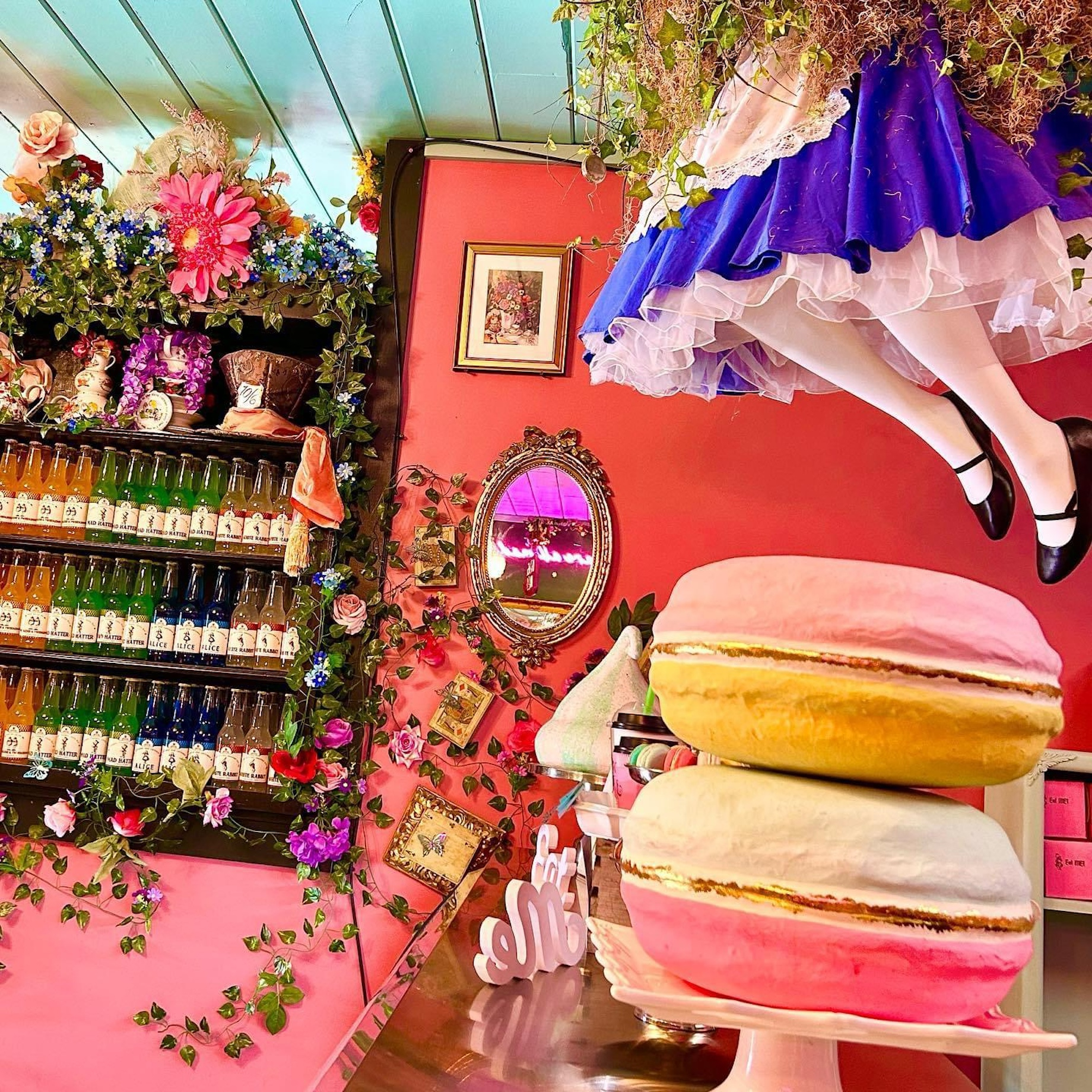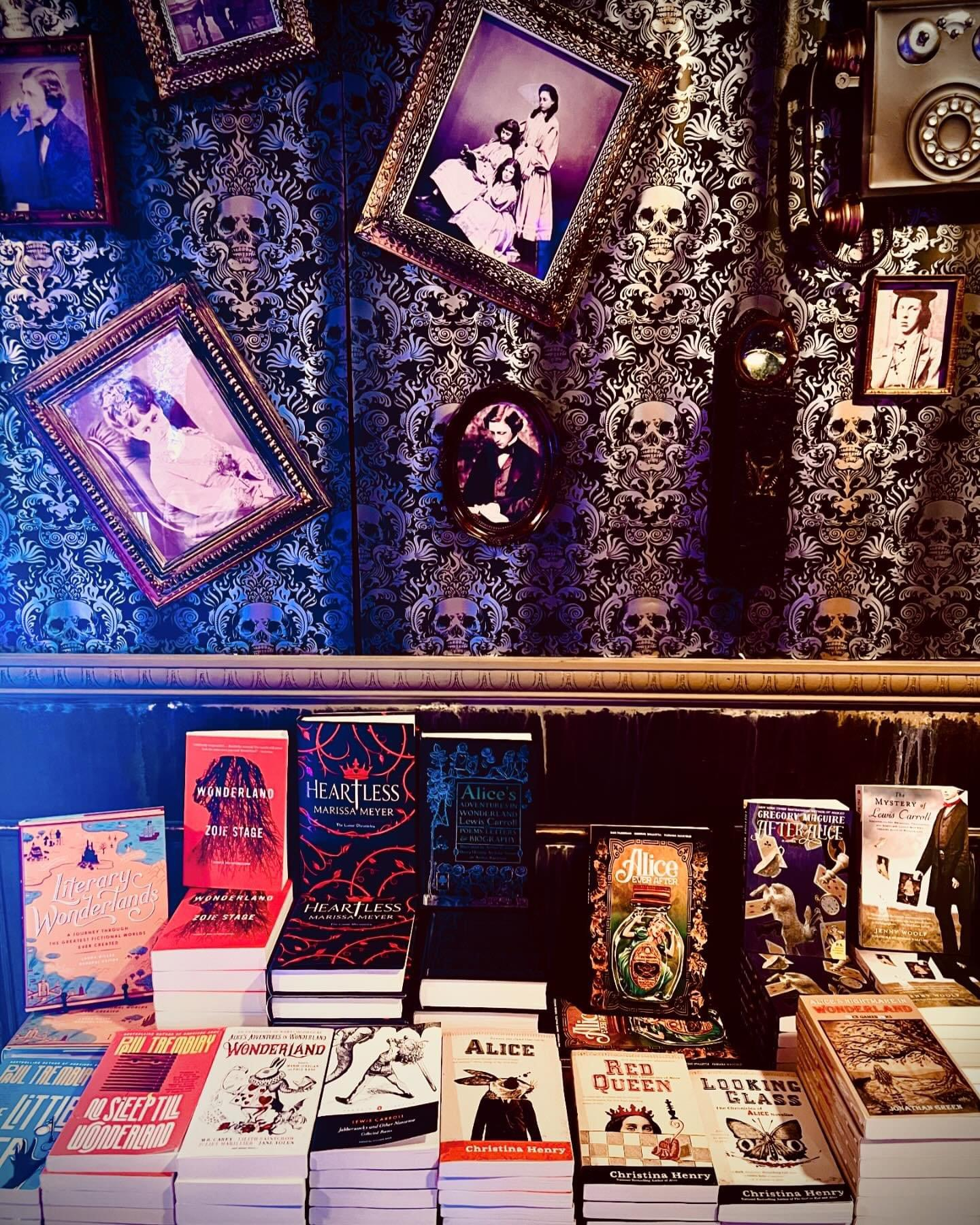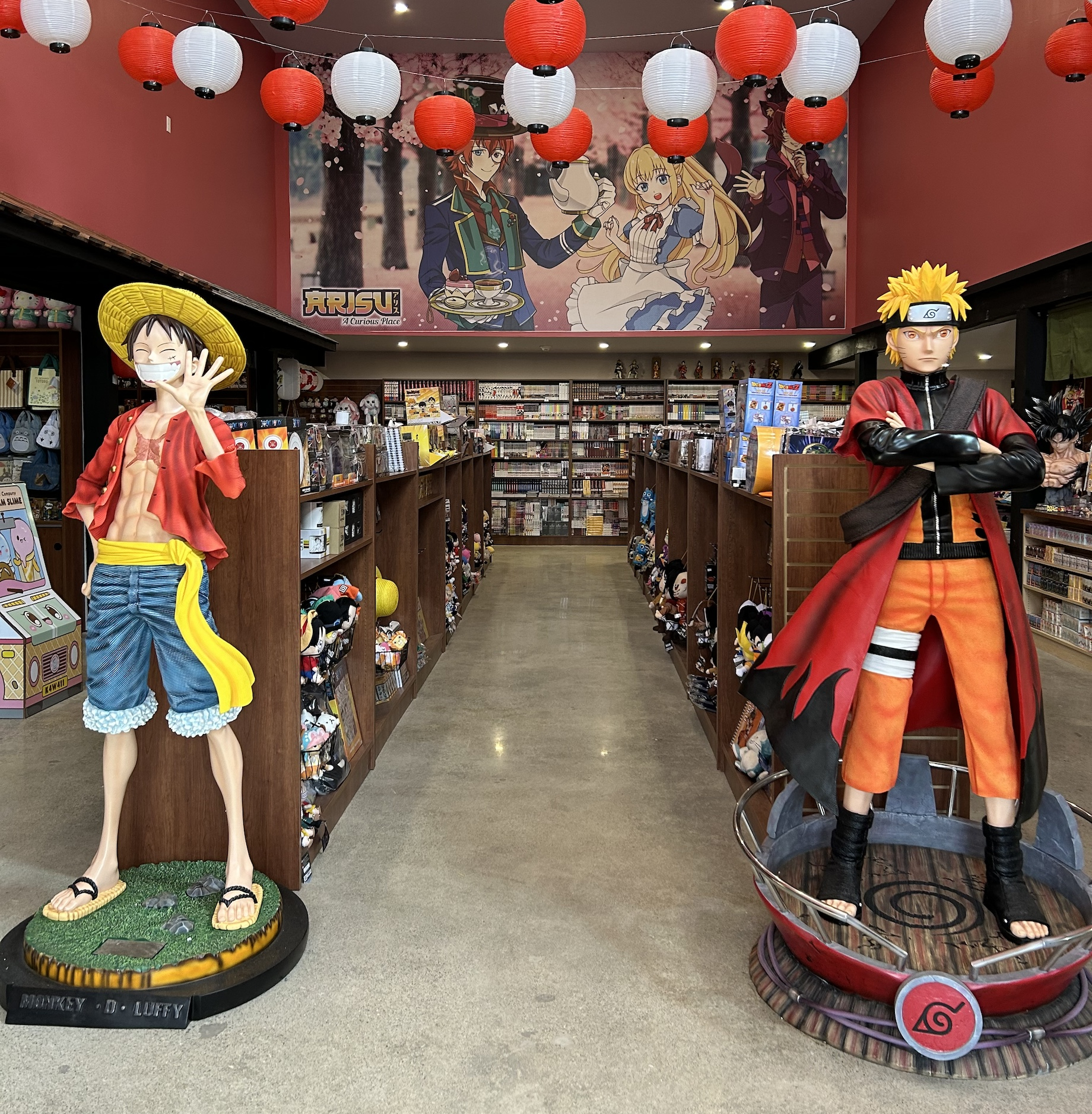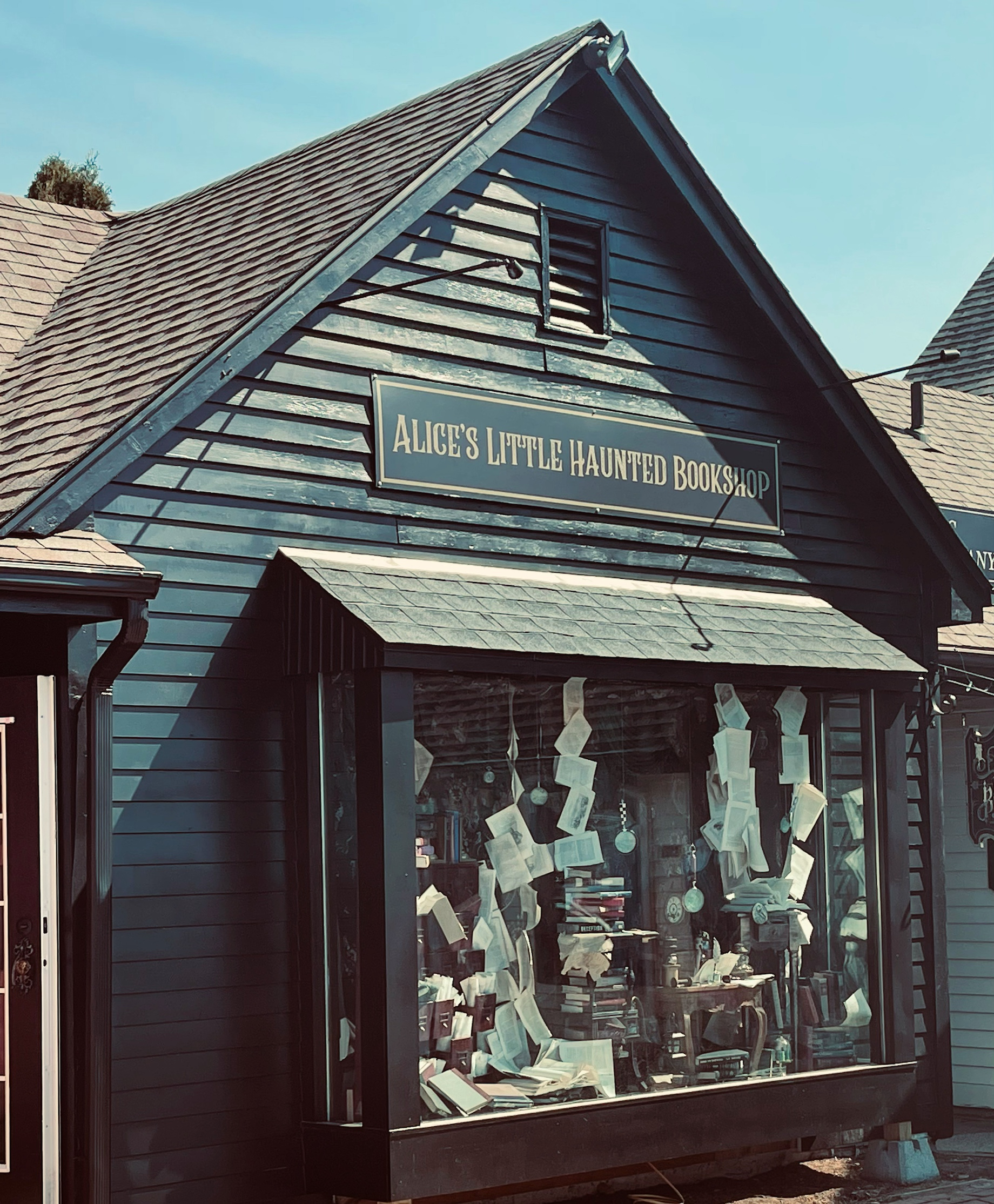Extending the shopping experience beyond transactions has been a trend in shopping centers for quite some time. Think Santa visits and, more recently, interactive art exhibits. Retailers now are on a mission to offer such experiences, as well.
An immersive retail environment is far more than a place to buy goods, said Wonderlosity CEO Ellie Greenberg. “It’s a destination. When you go into an immersive retail store, you feel like you’re being transported into that specific world.”
Wonderlosity operates four concepts. Alice in the Village, a tea room inspired by Alice in Wonderland, opened in 2016 in Mystic, Connecticut’s Olde Mistick Village. Wizarding and fantasy store The Cloak and Wand opened there in 2021, followed by gothic Victorian bookstore Alice’s Little Haunted Bookshop in 2022 and anime store Arisu in 2023. In 2022, The Cloak and Wand’s second location opened — in New Hope, Pennsylvania’s Peddler’s Village — and last month, Arisu’s second location opened, in Fairfield, Connecticut.
The concepts emphasize the experience of visiting almost as much as the shopping. “We don’t really see ourselves as equivalent to any other retail,” said Greenberg. “Take, for example, Alice in the Village. Yes, there are other places that sell bubble tea, but after you buy that bubble tea, you leave. It’s not an experience.”

Alice in the Village
Greenberg talked with ICSC Commerce + Communities Today and Small Business Center contributing editor Rebecca Meiser about why immersive retail is the future, as well as limitations to growth.
How do you define an immersive retail environment?
To engulf yourself in an experience. When you go into an immersive retail store, you feel like you’re being transported into that specific world. With Alice in the Village, for instance, you feel like you’re being transported into the Alice in Wonderland story. You see Alice coming down the ceiling. You go to the tea room and you feel like you’re in the Mad Hatter tea party. You take pictures. People cannot leave without taking pictures. If you go to our Cloak and Wand, you feel like you went into a village in Lord of the Rings. And then Arisu — you feel like you stepped into Tokyo.

Wonderlosity purposely made Alice’s Little Haunted Bookshop dark, said CEO Ellie Greenberg. “It feels like you’ve stepped into a haunted Victorian store. It’s a little creepy.”
It’s also about the experience and the merchandise. You have to make sure that you are matching the merchandise with what you’re selling. In Cloak and Wand, for example, we have a potion bar where you can create your own custom potions. At the end, you get your drink, which is very beautiful, and you get a label on the back that says: “You created a flying potion, and expect to fly!” When you pick a wand at the store, you don’t know the power of the wand. When you go and check out, then you get the card of what the wand’s power is. We really try to take that immersive experience and put in every aspect so you have that memory.
You created four immersive retail concepts that are totally different. Why diversify? Why not expand on just one concept?
For you to have that immersive experience that you have with Alice in the Village or with Cloak and Wand, it has to be in a location that can support the theme. I can’t open a Cloak and Wand next to a CVS in a shopping plaza. It’s not going to work. The locations in America that offer that kind of whimsical [opportunity] are limited and hard to find. I’m always on the lookout for where can I put my stores. I don’t feel like you’re going to go to Ulta Beauty to buy cosmetics then go buy a wand next door. So I need to find the right location to support the theme. Arisu is more of a store that I can see being opened in more traditional shopping places. It can open next to a CVS if I want to, but the rest of them, I can’t. That’s one reason we kept creating new concepts to put near where we already are.

Arisu in Mystic, Connecticut’s Olde Mistick Village
How does location add to the experience?
Our stores, especially Cloak and Wand and Alice’s Haunted Bookshop, appeal to a lot to tourists. We need to be in an area that also has some kind of a touristy destination to it. Then, the overall look has to be a little bit more unique. You need to really feel like: If I’m going to go into the store, I’m going to transport myself into a place of wonder. I’m going to transport myself to Hogwarts. I’m going to transport myself to Victorian England. Olde Mistick Village is a great location. Peddler’s Village in Pennsylvania is a great location. There are a couple of them, but it’s very limited.

Alice’s Little Haunted Bookshop in Mystic, Connecticut’s Olde Mistick Village
Mystic is a touristy town. It’s very important to us also when we’re opening other locations, especially for the non-Arisu stores, to be in tourist locations. When you go on vacation, your mindset is different than when you go shopping at your regular shopping center. People come already with the knowledge that “I’m here, I’m on vacation, I’m going to spend.” It’s very rare that people will go into one of our stores, enjoy it, take pictures, be impressed and not get something. We also have a large community around us. We have people that come back often. A lot of the time, they will just buy something small like a food item or a drink, but the conversion rate [visitors who buy] for us is very high. I want to say 80%.
What’s the buildout like for these stores?
I believe that one of the reasons we haven’t seen a lot of these immersive retailing stores in the United States is the cost. It varies, but outside of inventory and outside of the regular buildout, to theme a store will cost you between $100,000 to $400,000 depending on the size and the theme. That’s a big investment. If you are a first-time business owner and you have to invest in renovating the space, getting inventory and everything, many will say: “I can’t invest another $200,000 right now to put in those elements.” I completely understand that. However, long-term, it’s worthwhile. If you have something that people will travel to, if you have an experience, people will come.
Was it hard to translate the vision in your head to an actual brick-and-mortar store?
Yes. We created a lot of the prototypes ourselves. Think about the furniture, even the fixtures. You can’t really find Victorian bookshelves unless you go to antique stores. And Cloak and Wand [has] moving portraits. You’re looking at the portrait and it’s moving its eyes. You can’t buy that. For Alice’s Little Haunted Bookshop, a very talented set designer created this whole beautiful design for us and executed it for us. But a lot of things we had to invent ourselves over the years.
Arisu is your newest concept. Did you open it because you thought it might be more compatible with commercial developments?
I did it because I love it. I grew up on anime without realizing it. All of the cartoons that we watched in the ’80s were Japanese, but also, one of my teenage daughters is a huge anime fan. A couple of years ago, she convinced me to start watching anime with her. I really got into it and I realized there’s no true anime store, so I thought: “We need to do one.” Aside from that, yes: Arisu, in our plans, will probably grow the fastest because we don’t have the limit of location. Last May, we debuted in Mystic. This July, we opened our second location — in Fairfield, Connecticut — in a standalone location, not in a shopping center, which is very different. It’s interesting to see the comparison from a touristy, family-oriented [center] to a more urban setting that is a standalone location.
We’re looking to open at least two or three more Arisu stores in the next six to 12 months. Right now, we’re testing different markets and different sizes. Our Arisu stores currently are 4,000 to 5,000 square feet. We’re thinking about doing something that is a little bit smaller to see if we can deploy more smaller stores in larger areas.
Would have done anything differently on your entrepreneurial journey?
I underestimated the popularity of the stores when I opened them. Some of them are too small. I don’t know if it was a mistake. That’s something a lot of new business owners probably do. There’s a big [investment] difference between opening 1,200 square feet and 3,000 square feet. As a new business owner, you try to be more cautious. Alice in the Village is 1,300 square feet. The bookshop is 1,000 square feet. The Cloak and Wand in Mystic is about 1,500 square feet. The one in Peddler’s Village is 2,200 square feet. As our stores started to become really popular, all of a sudden, I was like: “Oh, I could have gone with a bigger space,” but you’re stuck. Especially when you invested so much in the space, you can’t just pack up and leave and go to a different location.
Are your stores profitable?
Yes, very profitable. Surprisingly, we’re in a position where I don’t need to look for extra investment. That might change if we decide that instead of opening two stores a year, we want to open five to 10.
What does your future look like?
I would love to be able to have at least 50 stores of Arisu in the next five to seven years. With the other stores, there [are] more site limitations, but I believe that we can find maybe 10 to 20 locations for the other stores in the next few years. We also get a lot of questions from people about franchising. We’re not doing that right now. Some of the stores I might see potential franchising: Alice’s Village or The Cloak and the Wand. That’s something that we will have to see. We do not have online stores — we haven’t needed it — but that’s something that we’re also working on. The key is, though, that we are looking to create online merchandise that is different from what is available in the stores.